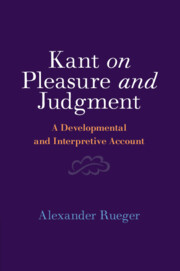Book contents
- Kant on Pleasure and Judgment
- Kant on Pleasure and Judgment
- Copyright page
- Contents
- Acknowledgments
- Abbreviations
- Introduction
- 1 The Early Reception of the Third Critique
- 2 The Completion of the System of the Powers of the Mind, 1770–1790
- 3 Kant’s Theory of the Feeling of Pleasure and Displeasure (I)
- 4 Kant’s Theory of the Feeling of Pleasure and Displeasure (II)
- 5 Consequences of the Theory
- 6 The Principle(s) of the Power of Judgment
- 7 The Interest of the Reflecting Power of Judgment and the Deduction of Judgments of Taste
- 8 The Imagination in Its Freedom
- 9 The Transition from Nature to Freedom
- Conclusion
- Bibliography
- Index
2 - The Completion of the System of the Powers of the Mind, 1770–1790
Published online by Cambridge University Press: 19 April 2024
- Kant on Pleasure and Judgment
- Kant on Pleasure and Judgment
- Copyright page
- Contents
- Acknowledgments
- Abbreviations
- Introduction
- 1 The Early Reception of the Third Critique
- 2 The Completion of the System of the Powers of the Mind, 1770–1790
- 3 Kant’s Theory of the Feeling of Pleasure and Displeasure (I)
- 4 Kant’s Theory of the Feeling of Pleasure and Displeasure (II)
- 5 Consequences of the Theory
- 6 The Principle(s) of the Power of Judgment
- 7 The Interest of the Reflecting Power of Judgment and the Deduction of Judgments of Taste
- 8 The Imagination in Its Freedom
- 9 The Transition from Nature to Freedom
- Conclusion
- Bibliography
- Index
Summary
In the third Critique Kant presented the completed system of the higher faculties of the mind, consisting of the understanding, the power of judgment, and practical reason. This chapter discusses, first, the meaning of ‘completeness’ in this context and analyzes Kant’s argument that a new faculty is required to complete the system. Here, a first (‘architectonic’) sense in which judgment mediates between nature and freedom is identified. Second, I identify a necessary condition for inclusion of a faculty in the system: a faculty has to play a constitutive role with respect to either cognition (understanding) or morality (practical reason) or the feeling of pleasure and displeasure (power of judgment). Finally, I trace the development of Kant’s views on pleasure and judgment in the metaphysics lectures from the 1770s, where we find that each faculty is associated with a characteristic sort of pleasure in the successful operation of the faculty.
Keywords
- Type
- Chapter
- Information
- Kant on Pleasure and JudgmentA Developmental and Interpretive Account, pp. 16 - 32Publisher: Cambridge University PressPrint publication year: 2024

